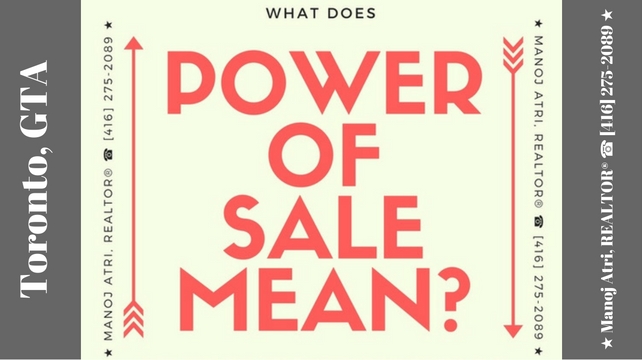💼🏡 How to Successfully Indulge in Greater Toronto Area (GTA) Power-of-Sale Real Estate Listings? 🏘️🔑 
Are You Looking for the Latest Bank Sales, Distress Sales, Repossessed GTA Real Estate For Sale Hot NEW Listings? If so, then you've come to the right place...
You can receive FREE priority access to All Power-Of-Sale TRREB Listings from all Real Estate companies! Specify your Desired Area in the Sign Up Form.
Buying a Power-of-Sale (POS) property in Toronto GTA can be a great way to score a deal on a home. However, it's important to understand the process and do your due diligence before making an offer. Here are some tips for successfully buying a Power-of-Sale property:Do your research: Before making an offer on a Power-of-Sale property, research the market and the property itself. Determine the property's market value and compare it to the asking price to ensure you're getting a good deal.
Hire a real estate agent: Working with an experienced real estate agent who is familiar with the Power-of-Sale process can help you navigate the complexities of buying a POS property. They can also provide valuable insights into the local market and help you make an informed decision.
Get pre-approved for financing: Many Power-of-Sale properties require buyers to have pre-approved financing in place before making an offer. Getting pre-approved can also help you determine your budget and avoid wasting time looking at properties you can't afford.
Do a thorough inspection: Power-of-Sale properties are often sold "As Is," which means you may be responsible for any repairs or issues with the property. Hire a qualified home inspector to thoroughly examine the property before making an offer so you know what you're getting into.
Be prepared for delays: The Power-of-Sale process can be lengthy and complex, and there may be delays in closing the sale. Be prepared for potential delays and work with your real estate agent and lawyer to ensure a smooth transaction.
What are Power-of-Sale listings in the Toronto GTA and how do they differ from regular listings?
Power-of-Sale listings in the Toronto GTA refer to properties that are being sold by a lender or mortgage holder, typically a bank or financial institution, due to the borrower's default on their mortgage payments. These listings occur when the lender exercises their right to sell the property in order to recover the outstanding mortgage debt.
Here are some key differences between Power-of-Sale listings and regular listings:
-
Seller: In a Power-of-Sale listing, the seller is the lender or mortgage holder, while in a regular listing, the seller is the property owner.
-
Process: Power-of-Sale listings follow a specific legal process outlined in the mortgage agreement and governed by provincial laws. The process allows the lender to sell the property without court intervention, with certain notice periods and requirements. Regular listings, on the other hand, involve direct negotiations between the property owner and potential buyers.
-
Pricing: Power-of-Sale listings are typically priced competitively or below market value as lenders aim to sell the property quickly to recover their debt. Regular listings may have more flexibility in terms of pricing and negotiation.
-
Condition: Power-of-Sale properties are sold on an "as-is" basis, meaning the lender does not make any warranties or guarantees about the condition of the property. Buyers are responsible for conducting their own inspections and due diligence. Regular listings may vary in condition, but sellers often provide more disclosure and potential negotiation for repairs or updates.
-
Terms: Power-of-Sale listings may have specific terms and conditions set by the lender, including timelines for closing and limited contingencies. Regular listings offer more flexibility in negotiating terms and contingencies based on the buyer's and seller's preferences.
It's important for buyers to conduct thorough due diligence, including property inspections and legal advice, when considering a Power-of-Sale property. Working with a real estate professional who has experience in Power-of-Sale transactions can help navigate the unique aspects of these listings and ensure a smooth process.
What are the differences between buying a Power-of-Sale property and a traditional Sale?
Buying a Power-of-Sale property and a traditional sale have several differences that buyers should be aware of:
First, Power-of-Sale properties are sold by the lender, usually a bank or financial institution, and are sold "As-Is" with no warranties or representations. This means that buyers should be prepared to conduct their own due diligence, including inspections and investigations, to ensure that they are aware of any potential issues or problems with the property.
Second, the timelines involved in the Power-of-Sale process can be shorter and more rigid than a traditional sale. Buyers may have less time to conduct inspections and complete their due diligence before submitting an offer, and there may be less room for negotiation with the bank.
Third, financing for a Power-of-Sale property may be more challenging. Some lenders may require a higher down payment or have stricter lending requirements for Power-of-Sale properties, which can make it more difficult for some buyers to secure financing.
Overall, buying a Power-of-Sale property can be a more complex and challenging process than a traditional sale, but it can also present opportunities for buyers to purchase a property at a potentially lower price. It's important to work with a knowledgeable and experienced real estate agent who can guide you through the process and help you make informed decisions.

How can I determine if a Power-of-Sale property is a good investment opportunity?
Determining if a Power-of-Sale property is a good investment opportunity requires careful evaluation and consideration of various factors. Here are some steps to help you make an informed decision:
-
Research the property: Conduct thorough research on the property, including its location, market trends, and potential for growth. Consider factors such as proximity to amenities, schools, transportation, and future development plans.
-
Assess the condition: Obtain a professional home inspection to assess the condition of the property. Determine if there are any major issues or repairs needed that could significantly impact your investment.
-
Evaluate the market value: Obtain a comparative market analysis (CMA) or appraisal to assess the current market value of the property. Compare it to recent sales of similar properties in the area to ensure you are paying a fair price.
-
Consider renovation or repair costs: Determine the estimated costs of any necessary renovations or repairs. Assess if these costs align with your budget and investment goals.
-
Calculate potential returns: Evaluate the rental income or resale value of the property based on market conditions. Consider factors such as rental demand, vacancy rates, and potential appreciation to determine if the investment will provide satisfactory returns.
-
Review legal and financial aspects: Seek professional advice from a real estate lawyer or financial advisor to review the legal aspects of the Power-of-Sale transaction, including any liens or encumbrances on the property. Understand the terms and conditions set by the lender and ensure they are favorable to your investment goals.
-
Assess your risk tolerance: Evaluate your risk tolerance and financial capability to handle the potential challenges and uncertainties that may arise with a Power-of-Sale property. Consider factors such as financing, property management, and market volatility.
It's important to conduct thorough due diligence and seek professional advice to assess the viability of a Power-of-Sale property as an investment opportunity. Working with experienced real estate professionals and consultants can provide valuable insights and guidance throughout the process.
How can I make an offer on a Power-of-Sale property in the Toronto GTA market?
Making an offer on a Power-of-Sale property in the Toronto GTA market involves following a similar process to making an offer on a traditional property. Here are the steps you can take:
-
Determine your budget: Assess your financial situation and determine the maximum amount you are willing to offer for the Power-of-Sale property. Consider factors such as your pre-approved mortgage amount, down payment, and additional costs.
-
Conduct market research: Research recent sales of similar properties in the area to get an idea of the property's market value. This will help you determine a reasonable offer price.
-
Work with a real estate agent: Enlist the services of a real estate agent experienced in dealing with Power-of-Sale properties. They can provide guidance, access to listings, and help you navigate the process.
-
Review the listing and offer process: Read and understand the terms and conditions set by the seller or the lender handling the Power-of-Sale property. Pay attention to any specific instructions or requirements regarding the offer submission.
-
Prepare your offer: Work with your real estate agent to draft a written offer. Include important details such as the offer price, proposed closing date, home + financing conditions, and any other terms or contingencies you wish to include.
-
Submit your offer: Present your offer to the seller or the representative handling the Power-of-Sale property. Ensure you meet any specified deadlines for offer submissions.
-
Negotiate and finalize the offer: The seller or the lender may accept, reject, or counter your offer. Negotiate any necessary terms until an agreement is reached. Once the offer is accepted and all parties have signed the agreement, the purchase process can move forward.
It's important to note that Power-of-Sale properties may have additional considerations and complexities compared to traditional sales. It's advisable to seek professional advice from a real estate lawyer and work closely with your real estate agent throughout the offer process. They can help ensure your interests are protected and guide you through any unique aspects of the Power-of-Sale transaction.
What are some negotiation tactics to use when buying a Power-of-Sale property?
When buying a Power-of-Sale property in the Toronto GTA market, it is important to have a solid understanding of the negotiation process. Here are some tactics that can help:
-
Know the market: Do your research on comparable properties in the area to determine a fair offer. Remember that Power-of-Sale properties may be priced lower than market value, but they may also require significant repairs or renovations.
-
Move quickly: Power-of-Sale properties often sell quickly, so be prepared to act fast. This means having your financing in order and being ready to make an offer as soon as possible.
-
Be flexible: Power-of-Sale properties are often sold "as-is", which means you may have to be flexible on the conditions of the sale. Consider offering a quick closing date or agreeing to purchase the property without any conditions.
-
Work with an experienced agent: A real estate agent who has experience with Power-of-Sale properties can be a valuable asset during the negotiation process. They can help you navigate the process and negotiate on your behalf.
-
Be respectful: Remember that the seller is likely going through a difficult time, so it is important to be respectful during the negotiation process. A friendly and professional approach can help build trust and increase the chances of a successful negotiation.
How can I ensure that the Power-of-Sale process is legitimate and legal?
To ensure that the Power-of-Sale process is legitimate and legal, it is important to do your due diligence and work with a qualified real estate agent and lawyer. Some steps you can take include:
-
Research the property: Conduct a title search to ensure that the property is in fact under Power-of-Sale and that the seller has the legal authority to sell it.
-
Hire a real estate agent: Work with a qualified and experienced real estate agent who has experience with Power-of-Sale properties and can guide you through the process.
-
Hire a lawyer: Hire a real estate lawyer to review all the legal documents related to the sale and ensure that the process is legal and legitimate.
-
Conduct a home inspection: Have a professional home inspector examine the property to identify any potential issues or problems that could affect the value of the property.
-
Be prepared to act quickly: Power-of-Sale properties can be sold quickly, so be prepared to act fast and make an offer as soon as possible if you're interested in the property.
By taking these steps and working with qualified professionals, you can ensure that the Power-of-Sale process is legitimate and legal, and that you're making a sound investment decision.

What is Power-of-Sale Home?
A Power-of-Sale home, also known as a foreclosure property, is a property that is being sold by the mortgage lender or financial institution due to the borrower's default on the mortgage payments. When a homeowner fails to make their mortgage payments, the lender has the legal right to sell the property in order to recover the outstanding debt. Power-of-Sale properties are typically sold at a price below the market value to expedite the sale process.
In a Power-of-Sale situation, the lender follows a specific legal process outlined in the mortgage agreement and relevant provincial laws. This process allows the lender to take possession of the property and sell it without going through the time-consuming and costly foreclosure process.
It's important to note that purchasing a Power-of-Sale property involves unique considerations and risks. Buyers should conduct thorough due diligence, understand the property's condition, potential liens or encumbrances, and any legal or financial implications associated with the sale. Working with a real estate agent experienced in Power-of-Sale transactions and consulting with a real estate lawyer can help navigate the complexities of purchasing a Power-of-Sale home.
How can a real estate agent help me navigate the Power-of-Sale Buying process?
A real estate agent can provide valuable assistance and guidance when navigating the Power-of-Sale buying process. Here are some ways in which a real estate agent can help:Access to Listings: Real estate agents often have access to a wide range of listings, including Power-of-Sale properties. They can help you identify and explore suitable options based on your preferences and budget.
Market Knowledge: A real estate agent is familiar with the local market dynamics and can provide insights into the current conditions and trends specific to Power-of-Sale properties. They can help you understand the pricing, competition, and potential risks involved.
Due Diligence: Buying a Power-of-Sale property requires thorough due diligence. A real estate agent can assist in gathering relevant information about the property, such as its condition, history, title status, and any potential liens or encumbrances. They can also help coordinate inspections and evaluations.
Negotiations: Real estate agents are skilled negotiators and can advocate on your behalf during the purchase process. They can help you present offers, negotiate terms, and ensure your interests are protected. Their experience in dealing with Power-of-Sale transactions can be particularly valuable in navigating potential challenges or complexities.
Transaction Management: Buying a Power-of-Sale property involves specific procedures and timelines. A real estate agent can guide you through the paperwork, contractual obligations, and legal requirements associated with the purchase. They can help ensure a smooth and efficient transaction.
It's important to choose a real estate agent who has experience and expertise in handling Power-of-Sale transactions. They should be knowledgeable about the legalities, potential risks, and intricacies involved to provide you with the best possible guidance throughout the buying process.
What does Power-of-Sale Mean?
Power of Sale refers to a legal provision that allows a mortgage lender to sell a property without court involvement in order to recover the outstanding balance of a mortgage loan. It is typically used when a borrower defaults on their mortgage payments. The Power of Sale process allows the lender to take possession of the property and sell it to repay the mortgage debt.
In a Power-of-Sale situation, the lender has the authority to initiate the sale of the property without going through the foreclosure process, which involves court proceedings. This gives the lender a quicker and more streamlined method to recover their funds.
The Power-of-Sale process is regulated by specific laws and regulations, which vary by jurisdiction. It typically involves the lender serving a notice of Power of Sale to the borrower, providing a specified timeframe for the borrower to rectify the default. If the borrower fails to cure the default within the specified period, the lender can proceed with selling the property.
It's important to note that the Power-of-Sale process differs from foreclosure, where the lender takes ownership of the property through a court order. The Power-of-Sale process is generally considered a more expedited and less costly method for the lender to recover their funds.
How to define Power of Sale in legal terms as per the Mortgages Act?
In legal terms, Power of Sale is defined as the right of a mortgagee (lender) to sell the mortgaged property without the intervention of the court, in the event that the mortgagor (borrower) defaults on the mortgage payments. This right is granted under the Mortgages Act and is outlined in the mortgage agreement between the lender and borrower. The lender has the authority to take possession of the property and sell it to recover the outstanding mortgage balance, plus any associated costs and fees. The process of selling the property is governed by the Mortgages Act and involves various legal and procedural requirements to protect the interests of both the lender and borrower.
Do you recognize the risks involved in purchasing a Power-of-Sale Home with warning signs of "As-Is" Clauses?
Yes, purchasing a Power-of-Sale home with "as-is" clauses can carry certain risks. When a property is sold "as-is," it means the seller is not making any guarantees or warranties about the condition of the property. As a buyer, it's crucial to thoroughly assess the property's condition and understand the potential risks before making a purchase.Here are some key risks associated with buying a Power-of-Sale home with "as-is" clauses:
Condition of the Property: The property may have underlying issues or require significant repairs and renovations. Without warranties or guarantees, you may be responsible for addressing these issues yourself, which can lead to additional costs.
Limited Inspection Opportunities: Power-of-Sale properties are often sold without the opportunity for a comprehensive inspection. This means you may not have a complete understanding of the property's condition, including hidden defects or structural problems.
Lack of Disclosure: Sellers of Power-of-Sale properties may not have the same legal obligations to disclose property defects as traditional sellers. You may need to rely on public records, available documentation, and your own due diligence to gather information about the property's history and potential issues.
Financing Challenges: Some lenders may be hesitant to provide financing for Power-of-Sale properties due to their condition or unique circumstances. This can limit your options and make it more challenging to secure a mortgage. To mitigate these risks, it's advisable to work with a qualified real estate agent and consider engaging professionals, such as home inspectors and real estate lawyers, who can help you assess the property's condition and navigate the legal aspects of the transaction.
Conduct thorough research, review all available documentation, and carefully weigh the potential risks and rewards before proceeding with the purchase of a Power-of-Sale home with "as-is" clauses.
How can I protect myself as a buyer when purchasing a Power-of-Sale property?
As a buyer, there are several ways to protect yourself when purchasing a Power-of-Sale property:
-
Get a home inspection: Just like any other property purchase, it's important to get a home inspection done to identify any potential issues with the property. This will help you make an informed decision about whether or not to proceed with the purchase.
-
Review the legal documents: Make sure to review all legal documents related to the Power-of-Sale process, including the Power of Sale Notice, Statement of Claim, and any other relevant documents. It's a good idea to have a lawyer review these documents with you to ensure that you fully understand your rights and obligations as a buyer.
-
Obtain title insurance: Title insurance can protect you from any unforeseen issues with the title of the property. It's important to obtain title insurance from a reputable provider to ensure that you're fully covered.
-
Research the property: Do your due diligence and research the property, including its market value, any outstanding liens or taxes, and any potential issues with the property that could affect its value.
-
Consult with a real estate agent: A real estate agent can help guide you through the Power-of-Sale process and provide valuable insights and advice. Make sure to choose an experienced agent who has dealt with power-of-sale properties before.
How can I find Power-of-Sale FREE listings in the Toronto GTA real estate market?
Finding free Power-of-Sale listings in the Toronto GTA real estate market can be challenging, as these listings are not typically publicly advertised or readily available for free. However, here are a few strategies you can consider:
-
Real Estate Websites: Some real estate websites may offer limited information on Power-of-Sale properties. Explore popular real estate listing websites and use search filters or keywords like "Power of Sale" or "distressed properties" to narrow down your search.
-
Networking and Connections: Reach out to real estate agents, mortgage brokers, and real estate investors who specialize in Power-of-Sale properties. They may have access to exclusive listings or be able to provide you with valuable insights and guidance.
-
Local Newspapers and Publications: Check local newspapers and publications for any foreclosure or Power-of-Sale notices. Some listings may be published in these sources, providing you with potential opportunities.
-
Real Estate Auctions: Attend real estate auctions, where Power-of-Sale properties may be listed for sale. Auctions can offer an opportunity to bid on distressed properties and potentially acquire them at a favorable price.
-
Hire a Real Estate Professional: Consider working with a real estate agent who specializes in Power-of-Sale properties. They can assist you in finding relevant listings, guide you through the buying process, and provide insights into the local market.
Remember, Power-of-Sale listings are subject to specific legal processes, and it's crucial to exercise caution and due diligence when pursuing these properties. Engaging the services of a qualified real estate professional and conducting thorough research will help ensure a smoother and more informed buying experience.
How can I determine if a Power-of-Sale property is worth investing in, given the current market conditions?
Determining whether a Power-of-Sale property is worth investing in depends on several factors, including the property's location, condition, and potential for appreciation. Additionally, it's important to consider the current real estate market conditions and how they may impact the property's value. Here are some steps you can take to evaluate a Power-of-Sale property:
-
Conduct a thorough inspection: Before making an offer on a Power-of-Sale property, have it inspected by a professional home inspector. This can help identify any major issues or needed repairs that may affect the value of the property.
-
Research the neighborhood: Look into the neighborhood where the property is located. Check the local crime rates, schools, and other amenities. Additionally, consider the area's real estate market trends, such as recent sales and property values.
-
Review the property's history: Research the property's history to see if it has been listed or sold in the past. This can help you determine whether the property has potential for appreciation.
-
Work with a knowledgeable real estate agent: A knowledgeable real estate agent can provide you with valuable insights into the local real estate market and help you make an informed decision about whether to invest in a Power-of-Sale property.
- Consider the potential costs: When evaluating a Power-of-Sale property, it's important to consider any potential costs associated with the purchase, such as repairs or renovations. Make sure to factor these costs into your overall investment decision.
General Provisions As to Power Of Sale: Mortgages Act
Power of Sale Process: Issuing A Notice Of Sale
House In A Power-Of-Sale [Video]
Power Of Sale: Proceed With Caution
Power Of Sale | Foreclosure
Thinking Of Buying A Power-Of-Sale Property?
|
|
|
Unable to find your Greater Toronto Real Estate For Sale Bank Listings, become a VIP BUYER & receive a personal FREE List Of Greater Toronto Area [GTA] Power Of Sale Listings (A Buyer Representation Agreement is a pre-requisite for all showings) including all the HOT NEW LISTINGS in your price range and preferred Area updated daily and sent automatically!
|
Act Now: In conclusion, embarking on a fixer-upper journey in Toronto can be a rewarding venture, but it’s essential to separate myths from facts to make informed decisions. Understanding the realities of renovating and transforming a property can save you time, money, and unexpected challenges. To equip yourself with the knowledge needed to succeed, Sign Up now to receive your FREE Report: Distress Sale, Fixer Upper - Myths & Facts: What You Should Know Before You Buy! This invaluable guide will uncover the truths behind common misconceptions, provide practical tips, and help you confidently navigate your fixer-upper journey. Don’t let uncertainty hold you back - download your free report today and take the first step toward turning your vision into reality!









